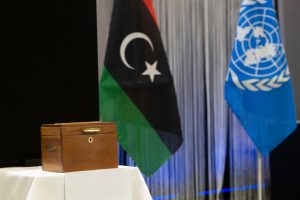By Sami Zaptia.

London, 6 February 2021:
The new Government of National Unity (GNU) ‘‘elected’’ yesterday by the Libyan Political Dialogue Forum’s (LPDF) in Geneva received support from numerous key Libyan stakeholders. The 74-members of LPDF were selected by UNSMIL after the country’s parliament split and got stuck in a political quagmire since its 2014 election.
Faiez Serraj
The incumbent prime minister designate and head of the Presidency Council, Faiez Serraj was one of the first to welcome the new administration. He is still only prime minister designate as parliament had recognized him as head of the Presidency Council but refused to endorse him and his government.
Serraj had vowed back in September 2020 to hand over power whenever a new administration is chosen consensually. His offer to handover followed demonstrations and shooting of protesters. The demonstrations were against his government’s ineffectiveness.
In the runup to the LPDF meeting to elect the new GNU, there had been reports of Serraj attempting to remain in power until the 24 December 2021 elections. However, Serraj never had any domestic power base and relied on international legitimacy. He has no coercive or political power to resist the handover to the GNU.
Ageela Saleh
Ageela Saleh, the head of the only internationally recognized Libyan parliament, the House of Representatives (HoR), based in Tobruk/Benghazi also welcomed the new GNU. His list of candidates had lost in the run-off vote to the eventual winning list.
He, nevertheless, still remains in the short term a key figure as head of the HoR. It is the only body that can approve the new GNU (within 21 days) and the only body that can pass legislation for the referendum law on the draft constitution.
The LPDF had stipulated in its Roadmap that the 24 December elections must be constitutionally based. For this to happen, the draft constitution must be approved by a popular referendum. Saleh’s leadership of the HoR will have a hand in how this precedes.
Analysts are split about Saleh’s LPDF defeat. Labelled by critics as the status quo or dinosaur candidate, a victory at the LPDF would have forced Saleh to give up his position as head of the HoR. He is seen by many as the major stumbling block in the HoR achieving progress since 2014. His removal from it could have thrust Libya forward in the knowledge that his new role as head of the Presidency Council would have been finite – until December this year. Others feared he would implement the same obstructionist policies as head of the GNU Presidency Council.
Khalifa Hafter
Through his official Spokesperson, Ahmed Mesmari, Khalifa Hafter, welcomed the new GNU. Analysts feel Salah’s loss in the Geneva LPDF run-off was Hafter’s win. A Saleh win would have relegated Hafter to a secondary role.
On the other hand, as long as a large number of the coalition of the Libyan National Army (LNA) remain loyal to Hafter, he still has effective, coercive power on the ground in the east. Without Hafter’s cooperation, no elections can be held in the east. Unlike Serraj but like his Deputy Ahmed Maetig, the GNU will have to talk to Hafter to get him onboard. Some kind of Faustian ‘‘deal with the devil’’ will have to be struck by the GNU to gain Hafter’s buy-in.
High State Council
The High State Council (HSC) welcomed the GNU. Its leader, Khaled Mishri, perceived to represent the Islamist wing of Libyan politics, had withdrawn from the contest to be in the GNU. Like the HoR, the HSC is enshrined in the 2015 Skhirat Libyan Political Agreement (LPA). The constitutional reforms needed to pass the draft constitution referendum law and the draft constitution will need the HSC’s approval. They play a strategic role and need to continue their newly established good relations with the HoR to pass any new reforms – to facilitate the 24 December elections.
It is believed that the HSC is happy with the new GNU.
Abdalla Thinni head of eastern Interim Government
Abdalla Thinni, prime minister of the eastern based Interim Libyan government announced that he is ready to “hand over power once the new body (GNU) is legally adopted by the HoR”. It will be recalled that the Thinni government is still the only government the internationally recognized HoR recognizes. Thinni was caretaker prime minister after his predecessor, Ali Zeidan, was removed by the General National Congress.
However, in his cleverly worded statement, Thinni left enough wriggle room to refuse to move over. He insisted that the GNU must receive approval by ‘‘the legitimately elected House of Representatives’’, and that his government awaits ‘‘the final word of the House of Representatives collectively and legally, in order to hand over the tasks to anybody chosen in accordance with the law’’.
However, Thinni depends on Saleh for legitimacy. He is originally from the south and has no power base in eastern Libya to survive independently. His ability to resist the new GNU without HoR support is very limited.
21 days for presentation of government and 21 days for HoR approval
Meanwhile, the GNA becomes a caretaker government until the GNU presents its government to the HoR. The GNU has 21 days to present its new government to the HoR. The HoR has 21 days to approve it. If the HoR fails to approve it within 21 days, as it did with the Serraj government, the GNU is referred to the 74 member LPDF for approval. This new stipulation built into the LPDF Roadmap means (or hopes?) the HoR and status quo stakeholders cannot count on obstructing the whole process by doing nothing.
Once the GNU is granted confidence by the HoR or subsequently by the LPDF, without any other measures, full powers of the executive branch are transferred to the GNU. All other existing executive powers (Thinni’s eastern government) will simultaneously be terminated. This ensures there is no room for any parallel bodies – as has happened since 2014.
Analysis
GNA v GNU
The previous Libyan internationally recognized government installed in 2015 was referred to as the GNA – the Government of National Accord. In reality, this name was a misnomer. It was at best an aspiration.
Failed to govern
The Serraj led administration failed badly to govern Libya. There were many reasons for this. But it was never able to achieve traction on the ground. Having been chosen in the 2015 Skhirat meetings, it lacked domestic legitimacy. Its inability to control the militias and enrol them into state security forces meant it had to share coercive force, which reduced if not lost it what little legitimacy it had. The inability to gain a monopoly on the use of legitimate coercive force meant it was unable to impose its will through decrees to impose its policies. Its failure to solve the country’s acute power cuts since 2015 is the most damning indictment.
Hence, over time, its inability to affect change on the ground made it lose even more legitimacy, making its job an even steeper uphill task.
International tug-of-war
The GNA got caught in the fight between the HoR in the east and the HSC in Tripoli, which the HoR saw as ‘‘Islamists and extremists’’ and under the control of the militias. It also got caught in the international fight for interference in Libya and the loss of interest in Libya by Europe and particularly the USA under Trump.
Since 2015, Serraj and his government failed to solve any of the country’s plethora of problems. This includes security and militia reforms, the cash crisis, power, petrol and cooking gas shortages.
The GNA was not a national government
The GNA definitely failed to become a national government. Even the most optimistic analysts when depicting its areas of ‘‘control’’ in graphics never ventured east past Sirte or south beyond the Western Nefusa mountains (excluding Zintan).
The south of Libya changed hands regularly depending on who sent money or troops. But while the Serraj government enjoyed episodes of control in the south, it was mostly under the influence of Hafter.
As for eastern Libya and the important eastern oil crescent, the Interim Abdalla Thinni government was the only recognized government by the east in the east. Hafter and his coalition of Libyan National Army (LNA) forces were always in control of the east.
Moreover, the Serraj government was always beholden to western militias. Rather than encompass the militias into the state and its institutions, the militias encompassed the state and its institutions into their structures. Serraj could operate as long as his policies did not conflict with militia interests.
Accord
The GNA under Serraj failed to achieve national accord, unity or harmony since arriving in Tripoli. Whether that is of its own making or not, the fact is it failed. Serraj failed to get a grip on Hafter and deal with him. Some say Serraj was naïve in his dealing with Hafter. Some say Hafter was all along disingenuous and never intended peace and unity for Libya. Either way, Serraj was unable to get Hafter to agree to implement a power-sharing deal that led Libya to harmonious accord. In fact, Hafter launched the war on Tripoli in April 2019 that led to even more discord in the country.
Having failed on all counts, Serraj insisted on remaining in power. With the HoR and HSC in deadlock, there was no other mechanism to remove him. Serraj in the end, may be unwittingly, contributed to Libya’s political quagmire by remaining in office – but not in power.
Fatal move
To compound this, Serraj made the fatal political error of vowing never to sit down and negotiate with the ‘‘war criminal’’ Hafter. This boxed Serraj in and it was only through his Deputy Maetig that the impasse was unblocked.
The GNU: Aspiration v reality
In view of all of the above, it will be seen if the GNU will fare any better. One advantage it has is that it has a very finite programme in a finite period of time: General elections by 24 December 2021.
Expectations of the GNU will be much lower. Most Libyans understand it can achieve very little by December. Equally, the GNU will not have aspirations to remaining in power for long. Its term is set.
Nevertheless, the GNU is but one cog in a set of wheels. It will be dependant on other entities doing their job. It will need acceptance by the local militias to be able to operate.
Because its aim is limited this could mean many status quo stakeholders may not perceive it as a threat, including the militias. It simply does not have the time to reform or attempt to implement change across all sectors.
The overseeing of elections will depend greatly on the HoR and HSC presenting it with a law for the referendum on the draft constitution. If these two bodies continue to fail Libya and obstruct forward progress, that cannot be blamed on the GNU.
The controversial draft constitution: Amazigh and Tebus
Where the GNU will need to play a constructive role is obtaining political approval for the draft constitution from Libya’s ethnic minorities. Remember, the Amazigh and Tebus ethnic minorities have refused to approve the draft constitution, even though the HoR steamrolled it through. If the HoR and HSC force the draft constitution to a referendum it could fall by failing in the referendum or through challenges in courts.
Much negotiating, horse trading and compromise is needed by all sides to arrive at a consensual draft constitution. The GNU will need to play – or be seen to be playing – a neutral conciliatory role.
BREAKING: New unified Libyan government selected by LPDF in Geneva | (libyaherald.com)
U.S denies attempting to influence LPDF process | (libyaherald.com)







